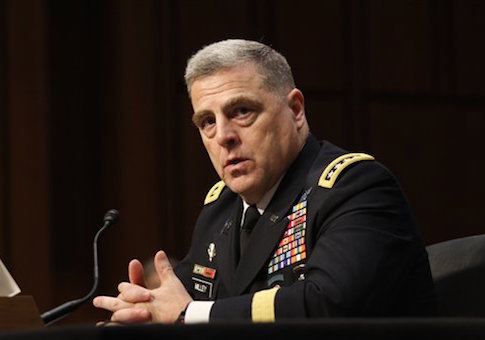President Barack Obama’s next choice for Army chief of staff said during a nomination hearing on Tuesday morning that the proposed military cutbacks introduced at the beginning of the month would increase national security risks.
General Mark. A Milley testified Tuesday before the Senate Armed Services Committee ahead of a confirmation vote on his nomination as the new Army chief of staff. During the questioning, Milley said the recent decision to reduce the armed forces could have a damaging impact on national security given the uncertainty over global threats.
"As we continue to drawdown to 450,000 by 2017, I think we are going to incur increased risk. We’ll have to see, we don’t know what the future requirements will be," Milley said.
Milley was responding to committee Chairman John McCain’s (R., Ariz.) opening statement, during which the former GOP presidential nominee criticized the scheduled cutbacks and discussed the new realities of the U.S. Army.
"As our nation confronts the most diverse and complex array of global crises since the end of World War II, the next Chief of Staff of the Army will be responsible for ensuring that the total Army—Active, Guard, and Reserve—remains the most decisive land force in the world, McCain said. "But unless Washington wakes up to the damage being done to our military right now by drastic reductions in defense spending, the Army will be forced to carry out its mission with fewer dollars, fewer soldiers, and aging equipment."
At the beginning of July, the U.S. Army announced plans to cut 40,000 troops over the next two years. McCain pointed out that the increased threats and reduction of troops to their lowest level since 2001 would be an obstacle for the new appointee.
"I think you would agree, General Milley, that when our assumptions about the world change, we must either adapt our conclusions to the new realities, or scale back our ambitions to meet our reduced means," McCain said. "Instead, the administration and many in the Congress are trying to have it both ways: asking our soldiers to take on a growing set of missions with fewer and fewer resources. And yet, while I believe there is no strategic rationale for the Army’s end-strength to fall below its pre-9/11 level of 490,000 troops, in recent years, the Army’s headquarters and administrative staff have grown at the same time it has cut Brigade Combat Teams. That, too, is wrong."
Milley agreed with McCain, saying that the current state of conflict around the globe will be cause to re-evaluate the military reduction.
"As Sen. McCain mentioned, there are a wide variety of security challenges around the world. So, if the demand continues to increase like it has in the past year, then I think we will have to reassess our risk assessment."
McCain continued to discuss the aging of military technology and said modernization will be key in protecting our troops abroad. The senator also encouraged the general to work with the committee and to use the resources provided with strict regulation.
"If confirmed, General Milley, I want you to be a relentless partner in this effort," McCain said. "To provide our soldiers the equipment they need to defend the nation, we simply cannot continue to have blurred lines of accountability and evasions of responsibility inside the defense acquisition system. The Army must ensure that its acquisition programs stay on schedule, within cost, and perform to expectations. And if that does not happen, General Milley, we will be calling you."
